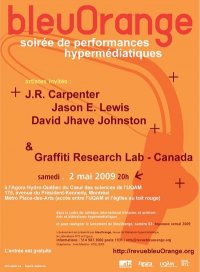Vous êtes cordialement invitées, invités à la soirée de performances hypermédiatiques bleuOrange, mettant en vedette J .R. Carpenter, Jason E. Lewis et David Jhave Johnston, trois artistes reconnus pour leurs pratiques d’écriture faisant usage des technologies numériques. Ils seront suivis d’une prestation du groupe Graffiti Research Lab – Canada.
J.R. Carpenter est la récipiendaire du Carte Blanche Quebec Award décerné par la Quebec Writer’s Foundation, elle a remporté deux fois la CBC Quebec Short Story Competition, ainsi que, plus récemment, le Expozine Alternative Press Award dans la catégorie Best English Book pour son premier roman, Words the Dog Knows. Ses œuvres de littérature électronique ont été présentées partout dans le monde. Elle est présidente du conseil d’administration du Laboratoire des Nouveaux Médias OBORO à Montréal.
http://luckysoap.com
Artiste du Web, David Jhave Johnston a débuté sa pratique comme poète avant d’intégrer les outils informatiques et numériques à sa production. Il est engagé dans de nombreuses collaborations, notamment avec le collectif torontois Year01 dans le cadre duquel il agit régulièrement à titre de commissaire. Son travail a été présenté notamment aux Biennales d’art contemporain de Montréal, en 2003, et de Toronto, en 2004. Diplômé de l’université Concordia en 2004 en Sciences informatiques, il a également complété une maîtrise en Arts interactifs à l’université Simon Fraser (Vancouver) en 2005 et est actuellement doctorant à Concordia.
http://www.glia.ca
Jason E. Lewis est un artiste des médias numériques et un designer de logiciels. Il est le fondateur de Obx Laboratory for Experimental Media, où il est le directeur des projets de recherche et de création. Leur objet est de trouver de nouvelles manières de produire et de lire des textes numériques, de développer des systèmes permettant un usage créatif de la technologie mobile, d’assurer le design d’interfaces alternatives pour des performances artistiques en direct et d’utiliser des environnements virtuels afin d’assister les communautés aborigènes dans la préservation, l’interprétation et la communication de leur histoire culturelle. Obx Labs est dévoué au développement de nouvelles formes d’expression en travaillant simultanément sur le plan conceptuel, créatif et technique. Les œuvres et les écrits de Jason E. Lewis sur les médias ont fait l’objet d’expositions et de conférences sur quatre continents. Il est présentement professeur associé au département des arts informatiques de l’Université Concordia.
http://www.obxlabs.net
Graffiti Research Lab – Canada. Quand la voix du peuple ne peut se faire entendre par les moyens traditionnels, la population doit opter pour des méthodes subversives. Entraîné dans les profondeurs de la plus grande jungle urbaine de la planète, le Graffiti Research Lab déploie un groupe d’agents canadiens de niveau Splinter Cell élite pour combattre l’establishment et pénétrer la conscience des masses. Extrêmement efficaces dans l’utilisation d’Armes de Défiguration Massive, ces agents dévoyés travaillent à la libération du peuple, et contre la guerre psychologique des agences de publicité. Leurs armes? Peindre avec la lumière et diffuser avec des lasers.
http://www.GraffitiResearchLab.ca
Les performances auront lieu le samedi 2 mai 2009, à 20 heures
à l’Agora Hydro-Québec du Coeur des sciences de l’UQAM
175, avenue du Président-Kennedy, Montréal
Métro Place-des-Arts, accès entre l’UQAM et l’église au toit rouge
Entrée libre
La revue bleuOrange (http://revuebleuorange.org) profitera du colloque international Histoires et Archives, arts et littératures hypermédiatiques (colloque2009.nt2.uqam.ca) pour tenir une soirée de performances d’œuvres hypermédiatiques le 2 mai 2009 à 20 h, et souligner le lancement du second numéro de bleuOrange, revue de littérature hypermédiatique.
bleuOrange est un projet soutenu par le Laboratoire NT2 : Nouvelles technologies, nouvelles textualités et Figura, le Centre de recherche sur le texte et l’imaginaire, tous deux rattachés au Département d’études littéraires à l’Université du Québec à Montréal.
INFORMATIONS
Alice van der Klei
Rédactrice en chef
bleuOrange, revue de littérature hypermédiatique
514 987.3000 poste 1931
info@revuebleuorange.org
http://revuebleuorange.org

. . . . .
